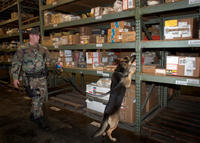-
Nanotech detection device emulates dog's nose to detect explosives

Inspired by the biology of canine scent receptors, scientists develop a chip capable of quickly identifying trace amounts of vapor molecules; the chip is part of a device which is both highly sensitive to trace amounts of certain vapor molecules, and able to tell a specific substance apart from similar molecules
-
-
Chemists convert greenhouse gas to fuel
What if you could take greenhouse gas and convert it to fuel for an energy-hungry world? Scientists, using modern genetics, accomplished exactly this; the researchers’ findings are just a first step toward converting carbon dioxide, one of the most abundant emissions from fossil fuel use, into usable hydrocarbons
-
-
DARPA seeking surveillance technology to predict future behavior
DARPA has teamed up with scientists from Carnegie Mellon University to create an artificial intelligence system that can watch and predict what a person will “likely” do in the future, using specially programmed software designed to analyze various real-time video surveillance feeds; the system can automatically identify and notify officials if it recognized that an action is not permitted, detecting what is described as anomalous behaviors
-
-
Scanning social media as a tool for biosurveillance
DHS is considering observing and scanning social media Web sites to collect and analyze health-related data which could help identify outbreaks of infectious diseases and other public health and national security risks
-
-
Improving the sensitivity of airport security screening
Scientists are reporting a simple way to improve the sensitivity of the test often used to detect traces of explosives on the hands, carry-ons, and other possessions of passengers at airport security screening stations; scientists concluded that swab fabrics could be improved to collect smaller amounts of explosives by peppering them with hydroxyl, phenyl and amine functional groups
-
-
Stunt kites raise wind power to another level

Researchers are sending stunt kites into the skies to harness the wind and convert the kinetic energy generated into electricity; the kites fly at a height of 300 to 500 meters, positioned to be caught by strong winds; cables, about 700 meters in length, tether the kites to vehicles and pull them around a circuit on rails; a generator then converts the kinetic energy of the vehicles into electricity
-
-
The world’s first circuit breaker for high voltage direct current (HVDC) will enable future DC grid

A Swiss company solves a 100-year-old electrical engineering puzzle by developing the world’s first circuit breaker for high voltage direct current (HVDC); it combines very fast mechanics with power electronics, and will be capable of “interrupting” power flows equivalent to the output of a large power station within 5 milliseconds – this is thirty times faster than the blink of a human eye; the solution will help shape the grid of the future
-
-
Nanostructured material stronger than a speeding bullet
Providing protection against impacts from bullets and other high-speed projectiles is more than just a matter of brute strength; while traditional shields have been made of bulky materials such as steel, newer body armor made of lightweight material such as Kevlar has shown that thickness and weight are not necessary for absorbing the energy of impacts; new tests of nanostructured material could lead to better armor against everything from gunfire to micrometeorites
-
-
DARPA seeks multi-band, portable sensor to provide soldiers with clear images
Clip-on or helmet-mounted camera system would fuse useful aspects of visible, near infrared, and infrared images into a single shot under all weather and visibility conditions; the Pixel Network for Dynamic Visualization program, or PIXNET, technology would ingest the most useful data points from each component sensor and fuse them into a common, information-rich image that can be viewed on the soldier’s heads-up display, and potentially be shared across units
-
-
New strategy for fingerprint visualization
Identifying fingerprints on paper is a commonly used method in police forensic work, but it is not easy to make those fingerprints visible. Now, scientists have developed a new approach for making such fingerprints more readily readable
-
-
Quick-cook method turns algae into oil
It looks like Mother Nature was wasting her time with a multimillion-year process to produce crude oil; University of Michigan engineering researchers can “pressure-cook” algae for as little as a minute and transform an unprecedented 65 percent of the green slime into biocrude
-
-
"Stutter jump" could improve performance of search and rescue robots
A new study shows that jumping can be much more complicated than it might seem; in research that could extend the range of future rescue and exploration robots, scientists have found that hopping robots could dramatically reduce the amount of energy they use by adopting a unique two-part “stutter jump”
-
-
Improving high-speed rail ties against freezing, thawing conditions
Research project is helping high-speed rail systems handle the stress of freezing and thawing weather conditions; the 3-year study looks at the freeze-thaw durability of concrete railroad ties; the research is essential to developing safe and durable high-speed rail systems
-
-
Researchers invent safe wireless vehicle charging technology
Researchers have invented a safe, efficient technology wirelessly to charge electric vehicles using “remote magnetic gears” — a rotating base magnet driven by electricity from the grid, and a second located within the car — and successfully tested it on campus service vehicles
-
-
Smart camera to describe what it sees -- and reason about what it cannot see
Army scouts are commonly tasked with covertly entering uncontrolled areas, setting up a temporary observation post, and then performing persistent surveillance for twenty-four hours or longer; what if instead of sending scouts on high-risk missions the military could deploy taskable smart cameras? A truly “smart” camera would be able to describe with words everything it sees and reason about what it cannot see
-
More headlines
The long view
New Technology is Keeping the Skies Safe
DHS S&T Baggage, Cargo, and People Screening (BCP) Program develops state-of-the-art screening solutions to help secure airspace, communities, and borders
Factories First: Winning the Drone War Before It Starts
Wars are won by factories before they are won on the battlefield,Martin C. Feldmann writes, noting that the United States lacks the manufacturing depth for the coming drone age. Rectifying this situation “will take far more than procurement tweaks,” Feldmann writes. “It demands a national-level, wartime-scale industrial mobilization.”
How Artificial General Intelligence Could Affect the Rise and Fall of Nations
Visions for potential AGI futures: A new report from RAND aims to stimulate thinking among policymakers about possible impacts of the development of artificial general intelligence (AGI) on geopolitics and the world order.
Keeping the Lights on with Nuclear Waste: Radiochemistry Transforms Nuclear Waste into Strategic Materials
How UNLV radiochemistry is pioneering the future of energy in the Southwest by salvaging strategic materials from nuclear dumps –and making it safe.
Model Predicts Long-Term Effects of Nuclear Waste on Underground Disposal Systems
The simulations matched results from an underground lab experiment in Switzerland, suggesting modeling could be used to validate the safety of nuclear disposal sites.
